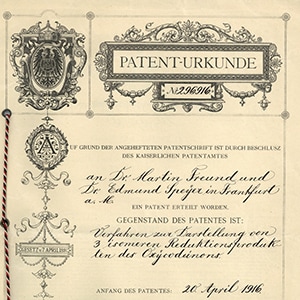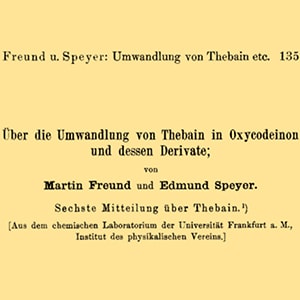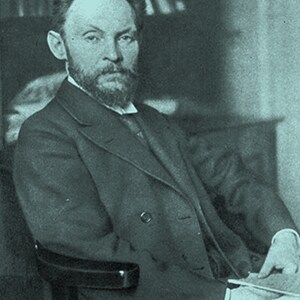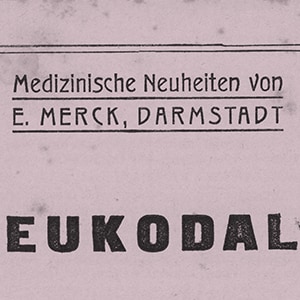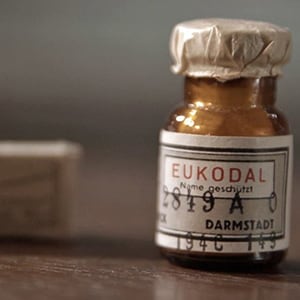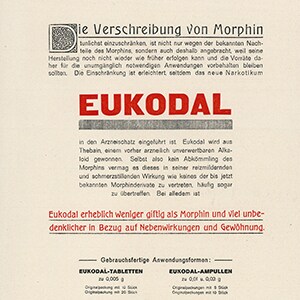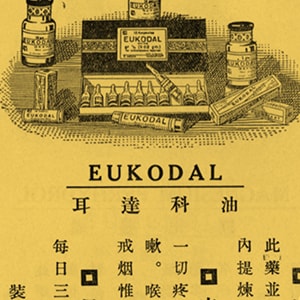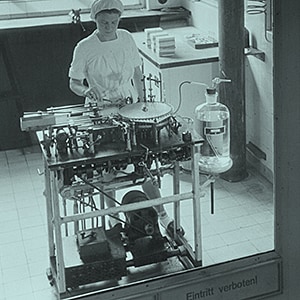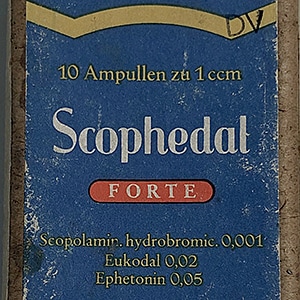
»›Pill Mills‹ are locations where uncaring and unethical ›doctors‹ prescribe bottle after bottle of pain meds […]. Many addicts (and drug dealers) came to Florida’s pain clinics complaining of a trumped-up illness so they could lay their hands on addictive pain pills like OxyContin. Doctors gave prescriptions out like candy.«
A Forever Recovery Treatment Center, 2017
Following the mandatory separation from its U.S. subsidiary Merck & Co. in the aftermath of World War I, the company loses access to the U.S. market for Eukodal, a powerful painkiller and cough suppressant that it had launched in 1917. But might collaboration on the basis of new contracts be an option? The stakes are extremely high for Merck & Co. as well. Although specialists in active ingredient production, they have little expertise in specialties. A hopeful George Merck writes a letter to Darmstadt in 1922 announcing a new catalog »containing initial details about various new products of yours, such as Eukodal«.
But this medicine – which is also potentially addictive – poses problems. The Drug Prohibition Law is strictly enforced. George passes on the news: »The new regulations will make it impossible to import the article. We therefore will have to manufacture here.« In 1923, a complex agreement is signed »under the terms of which E. Merck transferred to Merck & Co. its process for the manufacture«.
In Darmstadt, »E. Merck« markets seven Eukodal products and points out the risks in scientific information documents. In Germany, however, the strict regulations encounter resistance from doctors who see this as a »sign of mistrust«. Whereas precautions might be necessary in the United States, they felt the situation was entirely different here. Nonetheless, the Reich Health Office keeps a very close eye on developments. To help combat overdose and misuse, ipecac powder is combined with the active ingredient in 1927.
For Merck & Co., the difficulties continue: The company name »does not yet carry the necessary weight in dealings with physicians and other […] stakeholders«. Might manufacturing the compound and enlisting another company to market the medicine be the solution? Cordial relations exist with a large »pharmaceutical house«, after all. The attempt fails. In 1939, Sharp & Dohme writes: »The clinical tests on the product […] have led us to the grand conclusion that […] there would be no advantage in promoting it.«
Difficulties arise in Germany, too. The new German Drug Law of 1976 mandates complicated re-registration processes. An official early warning system on the addictive potential of medicines is set up. Health policy directives enforce price discounts. As a result, Eukodal is taken off the market in 1990. The medicine’s success story at the German company is over.
Today, the active ingredient is available once again from other manufacturers, and is prescribed to treat severe pain with strict monitoring in place. Oxycodone is sold in the United States as OxyContin. Irresponsible practices in the use of the product are summed up by the headline »Pill mills – Candy Stores for Addicts.«
Martin Freund (right) and Edmund Speyer synthesize the opioid oxycodone in 1916 at the University of Frankfurt in experiments to develop a »morphine substitute«. The company acquires rights to use the manufacturing process in return for a share of the profits. Efforts in Darmstadt to market the compound under the brand name Eukodal succeed in 1917.
In 1935, the scientific brochure recommends as follows: »Eukodal is indicated in all cases where strong pain relief is required, including neuralgia, colic, cancer pain, postoperative pain, and obstetrics… also as a cough suppressant and for laryngeal or pulmonary tuberculosis.«
A three-drug combination includings copolamine, ephetonine and Eukodal comes into widespread use in World War II. This drug combination provides powerful pain relief and produces »mental sedation«: »Given the enormous importance Scophedal has attained in wartime surgery, we intend to keep Eukodal stocks available in particular for this medicinal product.«

